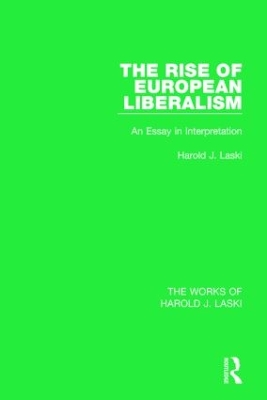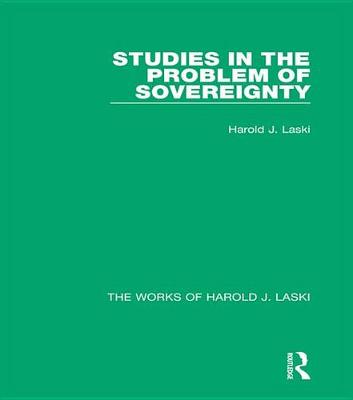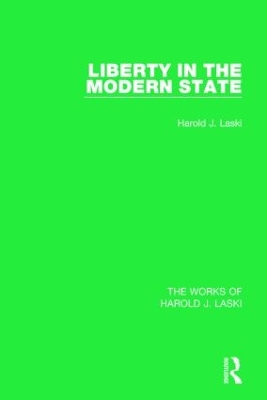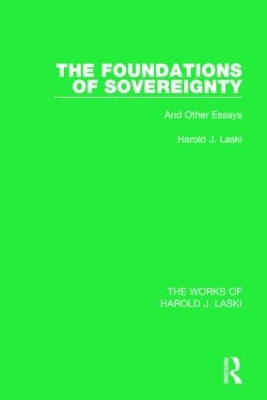The Works of Harold J. Laski
24 total works
The Rise of European Liberalism (Works of Harold J. Laski)
by Harold J Laski
A valuable piece of intellectual history, readable in its own terms, this volume, beginning with the Renaissance and the Reformation, traces the growth of Liberal doctrine until the advent of the French Revolution. It shows the relation of Liberalism to the new economic system, and the impact of this upon science, philosophy and literature. The book explains how the same causes which produced the Liberal spirit also produced the reasons for the growth of Socialism.
In this tract, Laski discusses the British case for the of Hitler from the angle of the university student, especially from America, who had doubts about the complexities of the situation. He illustrates why all parties in Britain felt that future freedom of intelligence depended on victory.
Laski's magnum opus, this volume outlines the history and functions of state institutions which (in the author's view) are desirable for the effective functioning of a democracy. Topics discussed include: The necessity of government; state and society; rights and power; liberty and equality; property as a theory of industrial organisation; the nature of nationalism; law as a source of authority; the functions of international organisations.
Reflections on the Revolution of Our Time (Works of Harold J
by Harold J Laski
Reflections on the Constitution (Works of Harold J. Laski)
by Harold J Laski
This work remains of interest to anyone concerned with Britain's political institutions and how they might be reformed. Laski was strongly in favour of utilising Britain's capacity for decisive government to drive through great social reforms. He was still confident that there was a majority will for such change and quite unable to imagine the kind of centralisation that was later to take place in the UK. If Laski is still important it is more for his pluralist views which counsel against such developments, but these lectures are still of interest in showing how a radical reformer could accept and defend established institutions like the House of Commons.
This is Laski's most important book after A Grammar of Politics. It discusses, on a grand scale, every aspect of American public life. Laski surveys American traditions and the American spirit, political institutions, the entire educational, religious, economic and social scene, America as a world power, and Americanism as a principle of civilisation. Laski's unsurpassed knowledge of American constitutional, social and cultural history is set in the perspective of his deep study of comparative constitutional history and political theory. He was one of very few people to see U.S. politics from the inside, as a result of his friendships with Roosevelt, Brandeis and Oliver Wendell Holmes.
This book, originally published in 1952, unfinished and perhaps imperfect, is the last book of one of the most acute political thinkers of the twentieth century. Laski's earlier optimism about a swing to the Left was beginning to be reversed, and in this volume he saw the defects of his previous optimistic surveys, which, in his opinion, still had value, but needed to be brought up-to-date and consquently he began to write an additional chapter which was never completed. It remains a valuable last word of an author who for thirty years was respected and listened to on the topic of civilisation's survial through change.
To mark the centenary of its first publication in 1848, the Labour Party issued this important special edition of the Communist Manifesto. In his (then) new historical introduction, Harold Laski discussed the authors of the Manifesto, their background and the development of their ideas. He outlined the history of the CommunistLeague, the struggles of the different sects and the emergence of Marx as a leader mandated to produce a programme. After surveying the genesis of the Manifesto, Laski discusses its contribution to world thought.
Studies in the Problem of Sovereignty (Works of Harold J. Laski)
by Harold J Laski
An influential study of political power, originally published in 1917. Laski's theoretical ideas are elaborated through examples drawn from political and religious movements, such as the Catholic Revival and the creation of the German Empire. He concludes that the state is not a supreme entity; it is one association among many that must compete for the people's loyalty and obedience.
This volume distils the themes expounded in A Grammar of Politics for the non-specialist reader. It is the best outline of Laski's views in his transitional period.
Programme for Victory (Works of Harold J. Laski)
by Harold J Laski, Harold Nicolson, Herbert Read, W. Miller Macmillan, Ellen Wilkinson, and G D H Cole
Written two years after the commencement of the Second World War, the chapters in this book succinctly put forward the case for reorganizing the foundations of the social order, by rejecting capitalism and historical equilibrium, both in Europe and further afield in the British Empire, in favour of building a Socialist civilization.
Updated to take into account the post-war political landscape, this book, consisting of some undelivered lectures originally dating from 1929, discusses the meaning and place of liberty and freedom in a global post-war context.
The Foundations of Sovereignty (Works of Harold J. Laski)
by Harold J Laski
This influential study, originally published in 1921, develops aspects of Laski's theory of the state, ideas he introduced in his first important publication, Authority in the Modern State (1919). According to Laski, the state is not a supreme entity; it is one association among many that must compete for the people's loyalty and obedience.
Parliamentary Government in England (Works of Harold J. Laski)
by Harold J Laski
This volume, originally published in 1938 can be read by anyone with an interest in the evolution of the institution of government in England and how the workings of some parts of it particularly relate to the problems of the first half of the twentieth century.









